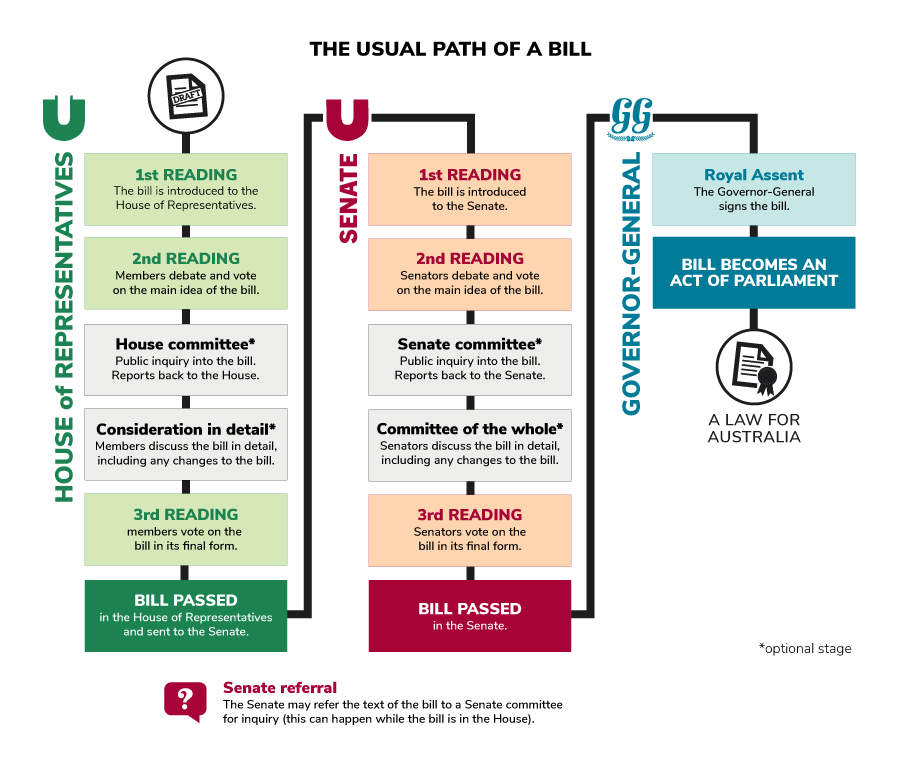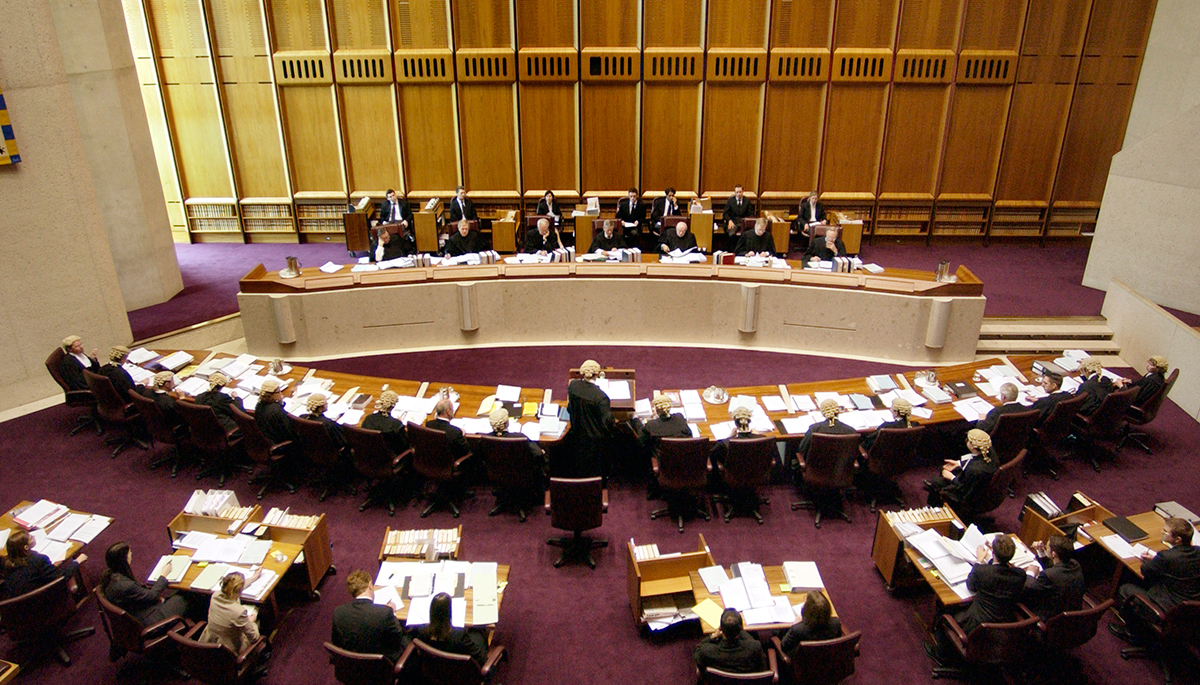Sources of law
This fact sheet introduces the different ways law is made Australia—statute law made by parliament, delegated law made by the Executive government and common law made in courts.
What will I learn?
- There are different ways that laws can be made in Australia.
- Statute law is made by parliament, delegated law is made by the Executive government and common law is made by judges in courts.
Curriculum alignment
Year 8 ACHCK063
Who makes law in Australia?
Australia is governed by laws which are made in different ways:
- statute law is made by parliaments
- delegated law is made by the Executive – the Prime Minister and ministers – or by government officials
- common law is made by the Judiciary – courts.
The law-making power of the Executive and the Judiciary is limited. Parliament has the power to overrule delegated law and to create statue that overrules common law.
The usual path of a bill.

Parliamentary Education Office (peo.gov.au)
Description
This diagram illustrates the usual path of a bill through the Australian Parliament to become Australian law.
In the House of Representatives a bill goes through the following stages:
- 1st reading—the bill is introduced to the House of Representatives.
- 2nd reading—members debate and vote on the main idea of the bill.
- House committee (optional stage)—public inquiry into the bill and reporting back to the House.
- Consideration in detail (optional stage)—members discuss the bill in detail, including any changes to the bill.
- 3rd reading—members vote on the bill in its final form.
The bill is passed in the House of Representatives and sent to the Senate.
Senate referral—the Senate may refer the text of the bill to a Senate committee for inquiry (this can happen while the bill is in the House).
In the Senate a bill goes through the following stages:
- 1st reading—the bill is introduced to the Senate.
- 2nd reading—senators debate and vote on the main idea of the bill.
- Senate committee (optional stage)—public inquiry into the bill and reporting back to the Senate.
- Committee of the whole (optional stage)—senators discuss the bill in detail, including any changes to the bill.
- 3rd reading—senators vote on the bill in its final form.
- The bill is passed in the Senate.
The bill is given Royal Assent—The Governor-General signs the bill.
The bill becomes an Act of Parliament—a law for Australia.
Copyright information
This work is licensed under a Creative Commons Attribution-NonCommercial-NoDerivs 3.0 Unported License.
You are free to share – to copy, distribute and transmit the work.
Attribution – you must attribute the work in the manner specified by the author or licensor (but not in any way that suggests that they endorse you or your use of the work).
Non-commercial – you may not use this work for commercial purposes.
No derivative works – you may not alter, transform, or build upon this work.
Waiver – any of the above conditions can be waived if you get permission from the copyright holder.
Law made by Parliament
Law made by Parliament is called statute law or legislation. Statute law is made when Parliament agrees to a bill – a proposal for a new law or a change to an existing one. In the Australian Parliament, a bill becomes a law after it has been passed by a majority vote by the House of Representatives and the Senate and is given Royal Assent{/glossarize] by the Governor-General. It is then called an Act of Parliament.
Law made by the Executive and government officials
Sometimes parliament gives the power to make laws to others. This is called delegated law because the power has been delegated – given – to someone else. The authority to make delegated law is generally given to ministers in the Executive or government officials. Delegated law can only be made under the authority of a statute law made by parliament.
Delegated law has the same legal effect as statute law. It can be made or changed without having to be debated and passed by parliament. Therefore, delegated law can be made quickly. However, parliamentary committees review delegated law and parliament can vote to overrule delegated law if it does not agree with it.
Law made in courts
The High Court of Australia.

DPS Auspic
Description
A large semi circular desk atop a small raise at the end of the room. Seven figures in black (High Court judges) with papers in front of them sit at this long desk. In front of them on the floor is an opposite curved desk with many figures in black with many papers in front of them. Smaller desks sit in rows behind.
Copyright information
Permission should be sought from DPS AUSPIC for third-party or commercial uses of this image. To contact DPS AUSPIC email: auspic@aph.gov.au or phone: 02 6277 3342.
The High Court of Australia.

DPS Auspic
Description
A large semi circular desk atop a small raise at the end of the room. Seven figures in black (High Court judges) with papers in front of them sit at this long desk. In front of them on the floor is an opposite curved desk with many figures in black with many papers in front of them. Smaller desks sit in rows behind.
Copyright information
Permission should be sought from DPS AUSPIC for third-party or commercial uses of this image. To contact DPS AUSPIC email: auspic@aph.gov.au or phone: 02 6277 3342.
Law made in courts is called common law, case law or judge-made law. Common law is made when judges make decisions in courts. When judging cases before them, judges use precedent – decisions made in previous similar cases – to guide their decisions. If no past cases with similar circumstances exist, a judge will make a new decision which would then become a precedent for similar cases in the future. If no statute law applies to cover a particular situation, common law will apply; however, statute law always overrides common law.
Australia inherited its system of common law from Britain. The name comes from the idea that common law applied to everyone in society – the common people.
